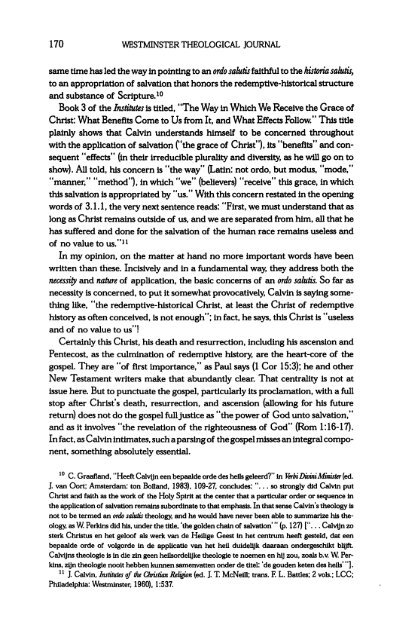NEW TESTAMENT THEOLOGY
Issues%20in%20New%20Testament%20Theology
Issues%20in%20New%20Testament%20Theology
Create successful ePaper yourself
Turn your PDF publications into a flip-book with our unique Google optimized e-Paper software.
170 WESTMINSTER THEOLOGICAL JOURNAL<br />
same time has led the way in pointing to an ordo salutis faithful to the historia salutis,<br />
to an appropriation of salvation that honors the redemptive-historical structure<br />
and substance of Scripture. 10<br />
Book 3 of the Institutes is titled, "The Way in Which We Receive the Grace of<br />
Christ: What Benefits Come to Us from It, and What Effects Follow." This title<br />
plainly shows that Calvin understands himself to be concerned throughout<br />
with the application of salvation ("the grace of Christ"), its "benefits" and consequent<br />
"effects" (in their irreducible plurality and diversity, as he will go on to<br />
show). All told, his concern is "the way" (Latin: not ordo, but modus, "mode,"<br />
"manner," "method"), in which "we" (believers) "receive" this grace, in which<br />
this salvation is appropriated by "us." With this concern restated in the opening<br />
words of 3.1.1, the very next sentence reads: "First, we must understand that as<br />
long as Christ remains outside of us, and we are separated from him, all that he<br />
has suffered and done for the salvation of the human race remains useless and<br />
of no value tous." 11<br />
In my opinion, on the matter at hand no more important words have been<br />
written than these. Incisively and in a fundamental way, they address both the<br />
necessity and nature of application, the basic concerns of an ordo salutis. So far as<br />
necessity is concerned, to put it somewhat provocatively, Calvin is saying something<br />
like, "the redemptive-historical Christ, at least the Christ of redemptive<br />
history as often conceived, is not enough"; in fact, he says, this Christ is "useless<br />
and of no value to us"!<br />
Certainly this Christ, his death and resurrection, including his ascension and<br />
Pentecost, as the culmination of redemptive history, are the heart-core of the<br />
gospel. They are "of first importance," as Paul says (1 Cor 15:3); he and other<br />
New Testament writers make that abundantly clear. That centrality is not at<br />
issue here. But to punctuate the gospel, particularly its proclamation, with a full<br />
stop after Christ's death, resurrection, and ascension (allowing for his future<br />
return) does not do the gospel full justice as "the power of God unto salvation,"<br />
and as it involves "the revelation of the righteousness of God" (Rom 1:16-17).<br />
In fact, as Calvin intimates, such a parsing of the gospel misses an integral component,<br />
something absolutely essential.<br />
10 C. Graafland, "Heeft Calvijn een bepaalde orde des heils geleerd?" in Verbi Divini Minister (ed.<br />
J. van Oort; Amsterdam: ton Bolland, 1983), 109-27, concludes: "... so strongly did Calvin put<br />
Christ and faith as the work of the Holy Spirit at the center that a particular order or sequence in<br />
the application of salvation remains subordinate to that emphasis. In that sense Calvin's theology is<br />
not to be termed an ordo salutis theology, and he would have never been able to summarize his theology,<br />
as W. Perkins did his, under the title, 'the golden chain of salvation' " (p. 127) ["... Calvijn zo<br />
sterk Christus en het geloof als werk van de Heilige Geest in het centrum heeft gesteld, dat een<br />
bepaalde orde of volgorde in de applicatie van het heil duidelijk daaraan ondergeschikt blijft.<br />
Calvijns théologie is in die zin geen heilsordelijke théologie te noemen en hij zou, zoals b.v. W. Perkins,<br />
zijn théologie nooit hebben kunnen samenvatten onder de titel: 'de gouden keten des heils' "].<br />
11 J. Calvin, Institutes of the Christian Religion (ed. J. T. McNeill; trans. F. L. Battles; 2 vols.; LCC;<br />
Philadelphia: Westminster, 1960), 1:537.


